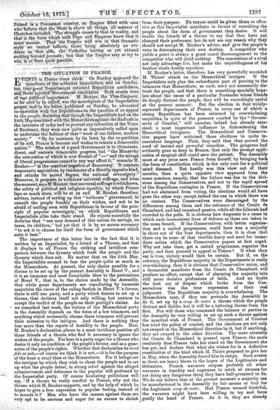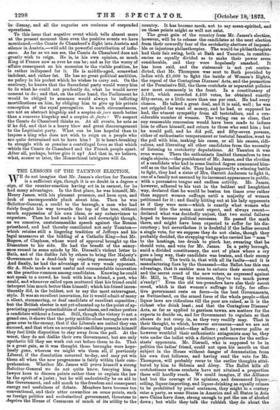THE SITUATION IN FRANCE.
suits it best." in three out of the four departments, then it is clear that The importance of this letter lies in the fact that it is there can be none of that terrible hurry and need for imme- written by an Imperialist, by a friend of a Throne, and that diate action which the Conservative papers at first urged. it displays to all France the striking and invidious corn- Why not take time, get a united programme, organise the parison between the dynasty which feats the people and the party, and then proceed to appeal to France ? If what they dynasty which does not. No matter that on the 24th May, say is true, victory would then be certain. But if, on the the Imperialists seemed to fear the people quite as much as contrary, the Republican majority in the Departments is really the Monarchists. At present, the only choice possible for a overwhelming, then it is obvious that Conservative union, and throne to be set up by the present Assembly is Henri V., and a favourable manifesto from the Comte de Chambord, will it is an immense and most formidable blow to the pretensions produce no effect, except that of alarming the majority into of Henri V., that is, to the choice made by the Assembly, still more decisive professions of faith. And no doubt that while great departments are repudiating by immense the first cry of despair which broke from the Con- majorities the views of the ruling faction in Henri V.'s favour, servatives was the true expression of their real there is still one party, and a party which desires to set up a judgment. The Republican majority is overwhelming. The throne, that declares itself not only willing, but anxious to Monarchists may, if they can persuade the Assembly to
accept the verdict of the people on their protege's claims. As do it, set up by a coup de main a throne which the people 7 we remarked last week, the victory of the Monarchical party distrust and dislike, but it will be a tottering throne from the in the Assembly depends on the votes of a few trimmers, and first. Nor will those who command the balance of parties in
anything which necessarily alarms these trimmers will prevent the Assembly be very willing to set up such a throne against their accession to the intrigue. And there is nothing they the manifest wish of France. The Government of Combat fear more than the repute of hostility to the people. Now, has tried the policy of combat, and the elections are not only M. Rouher's declaration places in a most invidious position all not swayed in the Monarchical direction by it, but if anything, those friends of a throne who find it necessary to ignore the they are swayed in the other direction. The more earnestly wishes of the people. For here is a party eager for a throne who the Comte de Chambord is pressed upon France, the more desire it only on condition of the people's favour, and as a guar- resolutely does France take her stand on the Government she
antee of the people's rights. Whether that declaration be bond has got., and declare that what she wishes for is a definitive fide or not,—of course we think it is not,—it is for the purpose constitution of the kind which M. Thiers proposed to give her
of the hour a cruel blow at the Monarchists. For it brings out in May, when the Assembly forced him to resign. Such events the intrigue by which they wish to cheat the people and to set as these are heavy blows to the hopes of the Legitimists and up what the people detest, in strong relief against the alleged Orleanists. French waverers surpass probably all other
submissiveness and deference to the popular will professed by waverers in timidity and eagerness to catch at excuses for the Imperialist party. Of course hesitating politicians will not doing any dangerous thing they have half-promised to do. say, If a throne be really needful to France, why not the We do not believe that at the present moment a majority can throne which M. Rouher supports, and by the help of which he be manufactured in the Assembly by fair means or foul for hopes to give a free expression to popular feeling, instead of the Legitimist coup de main. Had France seemed doubtful, to muzzle it ?' Men who have the masses against them are the waverers might have been willing to try and force very apt to be nervous and eager for an excuse to shrink gently the hand of France. As it is, they are already
from their purpose. No excuse could he given them so effec- tive as this Imperialist manifesto in favour of consulting the
people about the form of government they desire. It will enable the friends of a throne to say that they have net changed their preference, but do not see any reason why they should not accept M. Rouher's advice, and give the people's voice in determining their own destiny. A competitor who yields a point isalways a great moral discouragement to the competitor who will yield nothing. The concessions of a rival not only advantage him, but make the unyieldingness of his brother rivals doubly repulsive.
M. Rouher's letter, therefore, has very powerfully seconded
EVENTS in Fiance Come thick. 'On Sunday appeared the M. Thiers' attack on the Monarchical intrigue. If the 'Manifesto of the ortlaodox Imperialists, and on Sunday, Imperialists only play the subordinate part of proving to the too.; f*eat Departments returned Republican candidates,. trimmers that Monarchists, as such, need not necessarily dis iiek1 ilbirerrinient candidata. Both events were trust the people, and that there is something specially hope- d vast peVicalimiortance. M. Itouher, the Viee-Eniperor, less about the cause of a particular Pretender whose friends as h Med to be ealledwes the mouthpiece of the Imperialists do deeply distrust the people, they will be exceedingly useful proper', liefetter,Published on Sunday, he advocated at the present moment. But the election in four widely- co-operation With "the'Reptiblicans on the question of an appeal separated departments of France, in every one of which a to the people, declaring that though the Imperialists had on the strong Republican has been returned by overwhelming 24th Maycombinecl with the Monarchistsagainst the Radicals in majorities, in spite of the pressure exerted by the " Govern- the interests of order and to prevent any infraction of the Truce merit of Combat," will exercise, indeed has already exer- of Bordeaux, they were now quite as imperatively called upon cised, a most important influence in disheartening the to undertake the defence of that " work of our fathers, modern Monarchical intriguers. The Monarchical and Conserva- society." " By its manners, by its laws, by the re-partition tive papers have criticised these elections in quite in- of its soil, France is -become and wishes to remain a democratic consistent language. First, they said that they proved the nation." The mission' of a:good Government is to illuminate, need of instant and powerful remedies. The gangrene had direct, and restrain democratic progress, but "the Monarchy evidently gone so deep in France, that only the prompt appli- the restoration of Which is now dreamt of "—" and the mirage cation of surgical skill could save the patient. The Assembly of liberal programmes cannotin any way affect it," remarks M. must at any price save France from herself, by bringing back Rouher—" is the manifest negation of democracy. It combats the form of constitution which is the only cure for a political democratic aspiratiOns by tendencies of a directly opposite kind, mind diseased. But hardly was this view out of their and attacks its sacred dogma,- the national sovereignty." mouths, than a quite opposite view appeared from the Moreover, it propoi3arto Withdraw universal suffrage, and from same quarters, namely, that the failure was due to the divi- the moment, says Knoither, that universal suffrage is withdrawn, aims among the Conservatives, and not to the rapid spread the safety of political 'ata religious equality, by which France of the Republican contagion in France. If the Conservatives lays so much store, will be at an end. M. Rouher, therefore, had not abstained from voting, the elections would all have advises, instead of setting up this "hothouse" government, to gone the other way, except indeed the one in which there was consult the people frankly on their wishes, and not to be no contest. The Conservatives were discouraged by the afraid of uniting even with Republicans in favour of the prin- differences among them and the reticence of the Comte de ciple of popular sovereignty, on which Republicans and Chambord, and had remained passive, while all the Liberals had Imperialists alike take their stand. He rejects scornfully the crowded to the polls. It is obvious how desperate is a cause in doctrine that "one may demand of this nation its savings, its which such inconsistent lines of defence as these are taken in taxes, its children," but yet that it is by no means necessary the same breath. If the Conservatives, with better organise- " to ask it to choose for itself the form of government which tion and a united programme, could have won a majority in dismay, and all the auguries are ominous of suspended Operations.
To this issue that negative event which tells almost more at the present moment than even the positive events we have mentioned,—the Comte de Chambord's flight into Austria and silence in Austria,—will add its powerful contribution of influ- ence. As far as we can see, the Comte de Chambord does not greatly wish to reign. He is, in his own opinion, as much King of France now as ever he can be; and as for the worry of affairs consequent on his accession to the visible position, he is rather indisposed for it. He is- middle-aged, somewhat indolent, and rather fat. He has no great political ambition, no policy in his pocket which he wishes to carry out. On the -contrary, he knows that the Sacerdotal party would worry him to do what he could not prudently do, what he would never consent to do ; and that, on the other hand, the Parliament he would be obliged to summon would always be inflicting rnortifications on him, by obliging him to give up his private
• conception of the royal prerogative. In such circumstances, are not an abstract kingship and a sceptre de jure much better than a concrete kingship and a sceptre de facto ? We suspect the Comte de Chambord thinks so. At all events, he acts as if he did, and that is a heavy blow and great discouragement to the Legitimist party. What can be less hopeful than to impose a king who does not wish to reign on a people who are quite determined not to have him ? It is heart-breaking to struggle with so genuine a centrifugal force as that which whirls the Comte de Chambord and the French people apart. After all, perhaps, better give it up? And that is, we believe, what, sooner or later, the Monarchical intriguers will do.



































 Previous page
Previous page